|
Getting your Trinity Audio player ready...
|
The Brazilian subsidiary of Spain’s largest commercial bank Banco Santander has announced plans to launch digital assets trading services in the coming months for its clients.
Speaking to local newspaper publisher Folha de S. Paulo, the CEO of Banco Santander (Brazil), Mario Leão, said that the move was prompted by high demand for the service.
“We recognize that it is a market that is here to stay, and it is not necessarily a reaction to competitors positioning themselves; it is simply a vision that our client has demand for this type of asset, so we have to find the most correct and most educational way to do it,” said Leão.
He added that the bank hopes to share more information on its plans by its next quarterly report in October. According to the report, Santander Brazil is also considering offering tokenization services to issue traditional market assets as blockchain-based tokens.
The move is not the first time the Spanish banking giant has made a foray into blockchain technology and digital assets. In 2019, Santander entered a deal with IBM to use blockchain technology and AI to upgrade its cloud storage solution.
In March, its Argentinian subsidiary launched an agricultural loan scheme in partnership with Agrotoken. Considered a first of its kind, the scheme taps blockchain technology to extend loans to farmers, backing the loans with tokens related to agricultural commodities such as soya beans, corn, and wheat.
Brazilian banks embracing the digital assets market
Like Santander, several other financial institutions have demonstrated confidence in the digital assets market. Nubank, Brazil’s largest bank, launched its digital assets trading platform in May. The platform offers Bitcoin and Ether trading services and now has over 1 million users.
Similarly, Brazil’s largest private bank Itaú Unibanco shared designs to launch a blockchain-based tokenization platform that may eventually also allow for the trading of digital assets.
The increased activity of banking institutions in the digital assets industry in Brazil has been attributed to the country’s friendly approach to the market and high interest among investors. The government has been opening up the doors to digital assets by preparing legislation to provide the market with clarity.
According to a Bloomberg report, this is not only happening in Brazil. Other Latin American countries are also toeing this line and are seeing growing interest from digital assets firms and investors.
Watch: The BSV Global Blockchain Convention panel, Tokenizing Assets & Securities on Blockchain
https://youtu.be/wcelbeRGlRM

 07-02-2025
07-02-2025 





